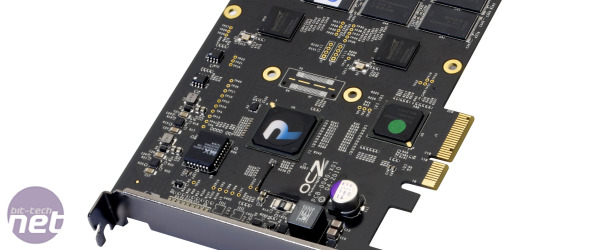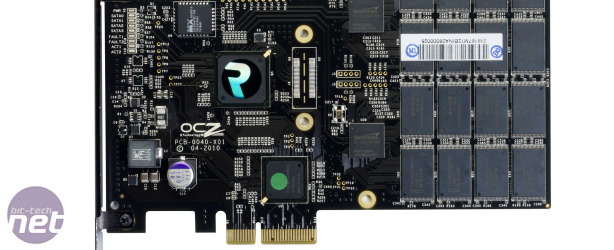OCZ RevoDrive Review: 120GB
September 3, 2010 | 07:38
Companies: #crucial #ocz-technology #sandforce

OCZ RevoDrive Review: 120GB
Manufacturer: OCZ TechnologyUK Price: £277.77 (inc VAT)
US Price: $374.00 (ex tax)
With SandForce-based SSDs now commonplace, and ever varying capacities being released on what feels like a weekly basis, we thought we’d seen all there was to see from SandForce. OCZ has decided that it’s not done with SandForce though, and has conjured up the Revo, a 4x PCI Express expansion cards with two SandForce controllers configured in a high-speed RAID 0 setup.
OCZ claims that the Revo can deliver sequential read speeds in excess of 540MB/sec, an incredible speed for a non-server piece of storage. The 4x PCI-E 1.1 interface used gives more bandwidth than a pair of SATA cables (1GB/sec rather than around 550MB/sec). Data is controlled by an on-board SATA 3Gbps RAID controller (the Revo ships with the array pre-built), in turn connected to a PCI-E bridge chip.

The RevoDrive delivers brilliant theoretical performance, thanks to the RAID controller and two SandForce chips. Click to enlarge.
In essence, the 120GB Revo is just two 60GB SandForce OCZ Vertex 2E disks strapped together (see over for the review of this drive); there are other version of Revo, from 60GB to 480GB. The casings have been ditched, leaving the chips exposed, so it’s easy to spot that the 128GB of NAND is split across 32 4GB Intel NAND modules, fitted onto both sides of the card, with two SF-1222TA3 SBH SandForce controllers handling 64GB each.
These are the same SF-1200 controllers as used in the Vertex 2E, G.Skill Phoenix Pro and every other SandForce drive on the market. As this is an OCZ drive though, both run the SF-1500 firmware, which boasts improved random write speeds over the typical SF-1200 firmware.
Like all new SandForce drives, the Revo also uses the revised level of over-provisioning (see over for more on this), leaving a formatted capacity of 111.69GB. This is identical to that of a standard 120GB OCZ Vertex2E, with the added benefit of a theoretical doubling of performance, as there are two drive controllers to process the data simultaneously. Of course, RAID arrays never work quite like that, but the performance improvement should be significant. This isn’t to be confused with the Crucial RealSSD C300’s technique of using a dual-core ARM CPU as its drive controller.

You can see the PCI-E bridge chip near the 4x connector, the RAID chip and its 'R' badge and the two SandForce chips quite clearly. Click to enlarge.
Using RAID has its disadvantages though, and the biggest one for SSDs is a lack of TRIM support. Despite the fact that the SandForce drive controller recognises the TRIM command, the RAID controller of the Revo doesn’t, blocking the command. This means that the drive could potentially suffer from heavy performance degradation with use.
When we first started hearing about SandForce, we were told its performance in a used state was almost as good as that in a fresh one, but we’ve found that this claim is only as good as the data the SSD handles. It’ll be interesting to see the ramifications of running a SandForce storage device without TRIM.
Another issue with RAID is that, despite the huge increase in theoretical and sequential performance, in the past we’ve found real-world speeds barely increase, as these are limited more by the drive’s access times.
While the NAND is typically the most expensive part of an SSD, this gets a bit more complicated when you have to develop a unique RAID card. As such, despite offering the exact same formatted capacity as the £250 Vertex 2E, the Revo costs £280. This is £30 more than simply buying two £125 60GB Vertex 2Es and building a RAID array yourself, so the Revo will have to impress in our testing to win us over.
Specifications
- Controller 2 x SandForce SF-1200 (with SF-1500 firmware)
- Cache None
- NAND 32 x 4GB Intel
- Formatted capacity 111.69GB
- Maximum quoted read Up to 540MB/sec
- Maximum quoted write Up to 450MB/sec
- MTBF 2,000,000+ hours
- Extras None
- Warranty Three years

MSI MPG Velox 100R Chassis Review
October 14 2021 | 15:04








Want to comment? Please log in.